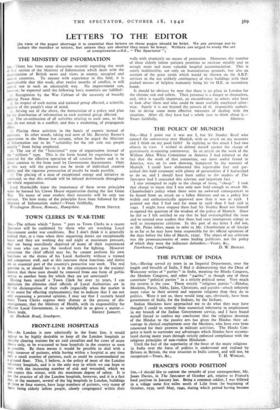FRONT-LINE HOSPITALS
London is now admittedly in the front line, it would appear to be highly desirable to keep all the London hospitals as casualty clearing stations for air raid casualties and for cases of acute illness only, to be evacuated to base hospitals in the country as soon as possible. By these means it would be possible to deal with a large turnover of patients, while having within a hospital at any time only a small number of patients, such as could be accommodated on a ground floor. This, I believe, is the policy of most of the London voluntary hospitals, and it is the only way in which we can hope to cope with the increasing number of sick and wounded, which we Can expect this winter, with the maximum degree of safety. It is not the practice of all the London hospitals, however' and it is a fact that, at the moment, several of the big hospitals in London, buildings of three or four storeys, have large numbers of patients, very many of than being elderly infirm people, closely congregated within their walls with absolutely no means of protection. Moreover, the number of these elderly infirm patients promises to increase steadily and to occupy more and more valuable hospital accommodation. This is surely indefensible, not only on humanitarian grounds, but also on account of the great strain which would be thrown on the A.R.P.- services in the not unlikely contingency of these buildings with their packed masses of helpless humanity being hit by H.E. or incendiary bomb.
It should be obvious by now that there is no place in London for the chronic sick and infirm. Their presence is a danger to themselves, and, what is equally important, an encumbrance to others who have to look after them and who could be more usefully employed other- wise. Surely it is not beyond the powers of th responsible authori- ties to devise some more effective measures of dealing with the situation. After all, they have had a whole year to think about it.—






























 Previous page
Previous page